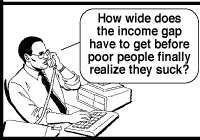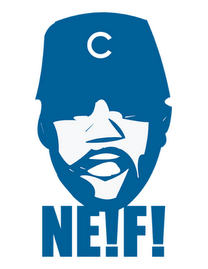Next big thing in law? Harsh jurisprudence of Thomas
By Adam Cohen
In the last 100 Supreme Court arguments, Clarence Thomas has not uttered a word. Court watchers have suggested a variety of explanations. Among the least flattering: he is afraid that if he speaks he will reveal his ignorance about the case; he is so ideologically driven that he invariably comes with his mind made up; or he has contempt for the process.
In their provocative new book, Supreme Discomfort: The Divided Soul of Clarence Thomas, two Washington Post journalists, Kevin Merida and Michael Fletcher, ponder Thomas' extraordinary silence, and many other puzzles. They offer a wealth of insight, but they have no answer to the central enigma he poses: why the justice who has faced the greatest hardships regularly rules for the powerful over the weak, and has a legal philosophy notable for its indifference to suffering.
It is a particularly timely question. For 15 years, Thomas was a marginal figure, rarely assigned to write major opinions because his views were so far right that he would have had trouble attracting five votes. But Thomas is a lot less marginal with the recent changes in the court — particularly the replacement of Sandra Day O'Connor, a moderate conservative, with Samuel A. Alito Jr., a more extreme one. He appears poised in the next few weeks to achieve his longstanding goal: dismantling the integrationist vision of his predecessor, Thurgood Marshall.
Thomas' early years were not as hardscrabble as his image-makers suggested during his confirmation; he left tiny Pin Point, Ga., when he was young, and was raised in a middle-class home. But he grew up in the Jim Crow South, with an absent father and an often-absent mother. He spent much of his childhood, the authors say, being ''angry and hurt.''
In college and law school, he identified strongly with his fellow blacks, and was liberal, even radical, on racial issues. But as he accepted jobs from Republicans eager to hire a conservative black lawyer, he shifted rightward. As chairman of the Equal Employment Opportunity Commission, his phlegmatic advocacy for victims of discrimination disappointed civil rights activists, while impressing conservatives looking for a replacement for Marshall.
His confirmation hearings, at which Anita Hill accused him of sexual harassment, put an even sharper edge on his ideology. He redirected his anger, much of which had been aimed at whites, at liberals and civil rights organizations. Thomas is now beloved on the far right, with friends like Rush Limbaugh, whose wedding he performed.
Thomas wasted no time unveiling his harsh jurisprudence. In his first year on the court, he dissented from a decision holding that the ban on cruel and unusual punishment may have been violated when guards kicked a prisoner and punched him in the stomach, eye and mouth. The prisoner had a split lip, bruises and loosened teeth, but Thomas insisted that the Constitution did not prohibit such "insignificant harm." He dissented from a ruling in favor of a prisoner who was handcuffed to a hitching post in the hot sun for seven hours while a guard taunted him about his thirst.
Thomas also dissented from rulings that the mentally retarded and juveniles could not be executed. He can be counted on to reflexively oppose discrimination claims of minorities and women, as he did last week, when he joined the majority in rejecting the claim of a woman who was underpaid for years because of her sex, on the dubious ground that she complained too late.
Thomas claims he is simply faithful to the "original intent" of the founders. But when the founders' intent is not involved — as in the pay discrimination case, which was based on a modern statute — he is just as quick to reach a harsh result.
When Thomas joined the court, he not only filled Marshall's seat, he also labored in his shadow. As a lawyer in Brown v. Board of Education, Marshall had persuaded the court to champion racial integration. When he arrived on the court in 1967, he pushed it in a humane direction not only on race, but also in areas like prisoners' and women's rights and fair elections. The court had largely stopped moving forward in these areas by the time Thomas arrived but, mainly due to O'Connor, it did not move backward that much, either.
That appears likely to change. The court heard arguments this term challenging Louisville's and Seattle's voluntary efforts to integrate their schools. The court has long upheld voluntary attempts to bring students of different backgrounds together, including, just a few years ago, the University of Michigan's affirmative action program. But this time, it is expected to strike down Seattle's and Louisville's, which is likely to make public schools much more segregated. With its new members, the court is also likely to make prisons less civilized, and workplaces, elections and criminal trials less fair.
When Marshall retired, O'Connor noted that he "imparted not only his legal acumen but also his life experiences" and made the court respond not only to his arguments but to "moral truth." America will be a much less just place if Thomas' life experiences and moral truth start to shape the court's agenda — and the nation's.
Subscribe to:
Post Comments (Atom)





















1 comment:
On the upside, with Thomas's help maybe we can go back to the days of slavery and he'll be off the court and pickin' cotton...
Post a Comment